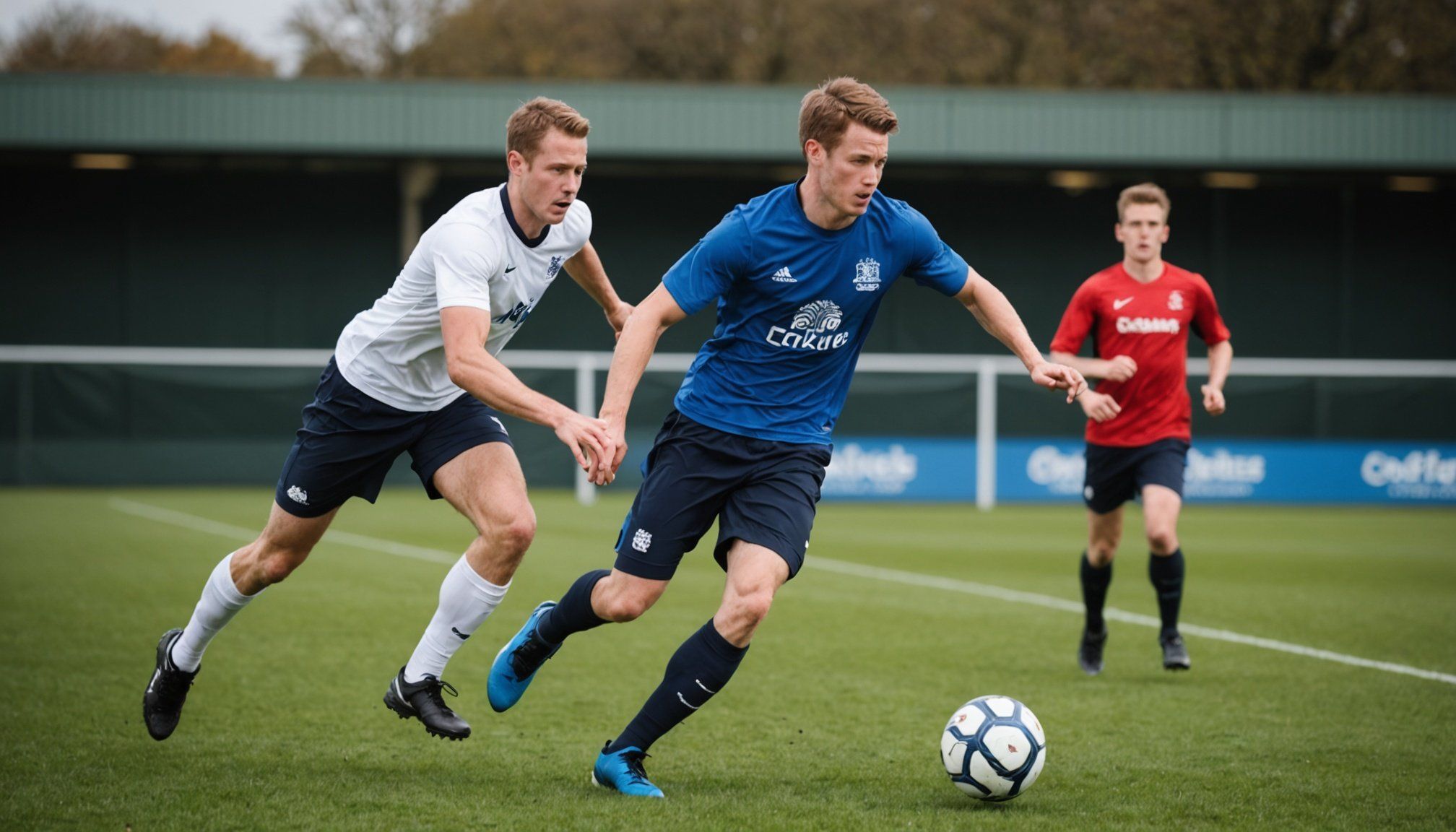Unleashing Athletic Potential: Innovative E-Learning Techniques for UK Sports Academies to Boost Training Performance
In the ever-evolving landscape of sports, the integration of innovative e-learning techniques is revolutionizing how athletes train, perform, and achieve their full potential. For UK sports academies, embracing these cutting-edge methods can be the key to unlocking superior athletic performance. Here’s a deep dive into the world of innovative e-learning in sports, highlighting the technologies, strategies, and benefits that are transforming the sports industry.
The Role of AI in Sports Performance
Artificial Intelligence (AI) has become a cornerstone in modern sports training, offering a plethora of tools and techniques that enhance athlete performance, prevent injuries, and optimize game strategies.
Also to discover : Revolutionizing Retail: Innovative Contactless Shopping Solutions to Enhance Customer Safety in the UK
AI-Driven Performance Analytics
AI allows for the meticulous analysis of vast amounts of data, providing insights into every aspect of an athlete’s performance. For instance, AI can break down an athlete’s running gait, shooting accuracy, and other critical performance metrics. As Dr. Emily Rodriguez, a sports scientist at Stanford University, notes, “AI allows us to break down every aspect of an athlete’s performance, from their running gait to their shooting accuracy”[2].
Here are some key ways AI-driven performance analytics are being used:
- Real-Time Tracking: AI-enabled wearables track heart rate, stamina, and stress levels, enabling coaches to adjust training programs in real-time to prevent overexertion and optimize recovery plans[3][4].
- Predictive Injury Prevention: By analyzing biomechanics and movement patterns, AI can identify early warnings of potential injuries, helping to design specific rehabilitation programs for each athlete[3][4].
- Game Strategy Optimization: AI analyzes opponent data to craft strategic plans, providing teams with a competitive edge. This includes identifying opponent weaknesses and making real-time tactical adjustments during matches[3][4].
Virtual Reality (VR) and Augmented Reality (AR) in Training
Virtual and Augmented Reality technologies are transforming the way athletes train by providing immersive and interactive experiences.
Immersive Training Experiences
VR allows athletes to simulate game scenarios and practice their responses in a controlled environment. Mark Lewis, a VR specialist working with NBA teams, explains, “VR allows athletes to simulate game scenarios and practice their responses in a controlled environment. The ability to replay and analyze virtual drills helps athletes develop muscle memory and improve their decision-making skills”[2].
Here are some benefits of VR and AR in sports training:
- Simulation of Game Scenarios: Athletes can practice different game scenarios, such as penalty kicks in soccer or free throws in basketball, in a highly realistic and controlled environment[2][3].
- Enhanced Decision-Making: By replaying and analyzing virtual drills, athletes can improve their decision-making skills and develop better game strategies[2][3].
- Injury Rehabilitation: VR and AR can also be used in rehabilitation programs, allowing athletes to practice movements and exercises in a safe and controlled environment[3].
Personalized Nutrition and Mental Preparation
Beyond physical training, innovative e-learning techniques also focus on personalized nutrition plans and mental preparation to ensure athletes are performing at their best.
Personalized Nutrition Plans
AI-driven nutrition plans are tailored to each athlete’s specific needs, taking into account their dietary requirements, training schedule, and performance goals. This personalized approach helps athletes maintain optimal health and energy levels throughout their training and competitions[2][3].
Mental Health and Preparation
Mental health is a critical aspect of athletic performance. Innovative e-learning platforms offer tools and resources for mental preparation, including stress management, focus enhancement, and resilience building. As Pullela Gopichand, Chief National Coach of the Indian badminton team, emphasizes, “Sports have always been central to holistic development. Mental skills like discipline, attention, teamwork, and resilience are essential for academic and personal success”[5].
Here are some ways e-learning supports mental health and preparation:
- Stress Management: Online resources and AI-driven tools help athletes manage stress and maintain a healthy mental state during intense training periods[5].
- Focus Enhancement: Techniques such as mindfulness and concentration exercises are provided through e-learning platforms to help athletes improve their focus and mental clarity[5].
- Resilience Building: E-learning programs include modules on resilience and coping strategies, helping athletes to bounce back from setbacks and maintain a positive mindset[5].
Integrating Technology into Training Programs
The integration of technology into training programs is not just about adopting new tools; it’s about creating a holistic approach to athlete development.
Wearable Technology and Data Analysis
Wearable devices and AI systems work together to track critical metrics such as heart rate, fatigue levels, and movement patterns. This data is then analyzed to provide insights that help coaches adjust training routines and optimize recovery plans.
| Technology | Benefits | Examples |
|---|---|---|
| Wearable Devices | Real-time tracking of heart rate, stamina, and stress levels | AI-enabled smartwatches, fitness trackers |
| AI Systems | Analysis of performance metrics, predictive injury prevention | AI-driven performance analytics software |
| Video Analysis | Detailed analysis of game footage to identify strengths and weaknesses | AI-powered video analysis tools |
Metaverse and Virtual Learning Environments
The metaverse is opening up new possibilities for sports training by creating virtual shared spaces for global collaboration and learning. Athletes can attend virtual lectures, engage in cross-border projects, and participate in immersive learning experiences that simulate real-world scenarios.
Here are some ways the metaverse is being used in sports training:
- Virtual Lectures: Athletes can attend virtual lectures and workshops conducted by coaches and experts from around the world[1].
- Cross-Border Projects: The metaverse enables athletes to collaborate on projects with peers from different countries, fostering a global learning environment[1].
- Immersive Learning Experiences: Virtual reality environments simulate real-world scenarios, allowing athletes to practice and learn in a highly realistic and interactive way[1].
Practical Insights and Actionable Advice
For UK sports academies looking to implement these innovative e-learning techniques, here are some practical insights and actionable advice:
Start with Data-Driven Decisions
- Use AI to Analyze Performance Data: Implement AI-driven performance analytics to gain deep insights into athlete performance. This will help you make informed decisions about training programs and strategies[3][4].
- Monitor Heart Rate and Fatigue: Use wearable devices to track heart rate and fatigue levels in real-time. This data can help prevent overexertion and optimize recovery plans[3][4].
Invest in VR and AR Training
- Simulate Game Scenarios: Use VR to simulate game scenarios and help athletes practice their responses in a controlled environment. This can significantly improve decision-making skills and muscle memory[2][3].
- Enhance Mental Preparation: Incorporate VR and AR into mental preparation programs to help athletes visualize and prepare for different game scenarios[2][3].
Focus on Holistic Development
- Personalized Nutrition Plans: Provide athletes with personalized nutrition plans tailored to their specific needs. This can help maintain optimal health and energy levels[2][3].
- Mental Health Support: Offer resources and tools for mental health and preparation. This includes stress management, focus enhancement, and resilience building[5].
Innovative e-learning techniques are revolutionizing the way athletes train and perform. By leveraging AI, VR, AR, and other cutting-edge technologies, UK sports academies can give their athletes a competitive edge. Whether it’s through data-driven performance analysis, immersive training experiences, or personalized nutrition and mental preparation, these techniques are designed to enhance athletic performance, prevent injuries, and foster holistic development.
As we move forward in this era of technological advancement, it’s clear that the future of sports training is not just about physical prowess but also about mental preparation, data-driven decisions, and innovative learning environments. By embracing these innovations, UK sports academies can unleash the full potential of their athletes and achieve greater success in the competitive world of sports.










